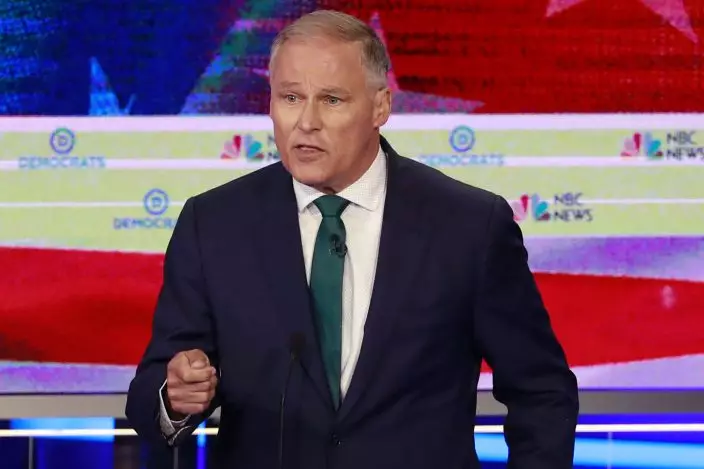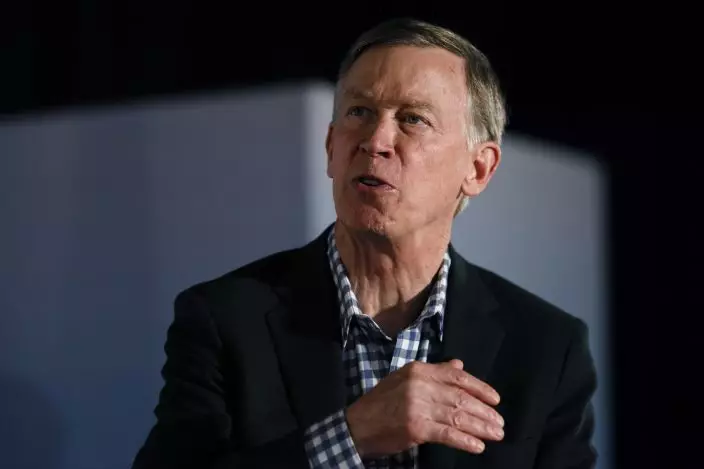As her campaign bus trundled along Interstate 80 toward the Michigan-Ohio border, Kirsten Gillibrand was offering wedding planning advice to one of her presidential campaign staffers who recently got engaged.
The New York senator recommended a Christmas wedding, preferably on a Caribbean island, until a senior aide intervened — reminding Gillibrand that the staffer will be "otherwise engaged at Christmas," which is just six weeks before the Iowa caucuses.
The good-natured exchange belied a larger doubt hanging over Gillibrand's 2020 bid: Will it really survive to the Feb. 3 caucus that kicks off the process of selecting a Democratic presidential nominee?

FILE - In this June 26, 2019, file photo, Democratic presidential candidate Washington Gov. Jay Inslee speaks during a Democratic primary debate hosted by NBC News in Miami. Plagued by anemic polling and fundraising, many 2020 Democratic presidential campaigns have fallen into a spiral of perceived struggles that become increasingly self-fulfilling. That includes New York Sen. Kirsten Gillibrand’s championing of women’s rights, Inslee’s focus on climate change and former Colorado Gov. John Hickenlooper’s pitch as a principled moderate. (AP PhotoWilfredo Lee, File)
Many of the candidates mired in the primary's lower tier have quietly begun asking similar questions. Plagued by anemic polling and underwhelming fundraising , some campaigns are falling into a spiral of perceived hurdles that are becoming increasingly self-fulfilling, making it hard to find money to build an expansive campaign organization.
The anxiety is building ahead of September's presidential debate, which impose tougher qualification rules that will winnow the field from two dozen candidates. That's a humbling prospect for senators and governors who have spent their political careers building what they hoped would be strong resumes for a White House run only to face the reality that voters aren't interested or, worse, don't know who they are.
Ohio Rep. Tim Ryan has run on bridging the divide between the party's liberal and working class wings, but is barely registering in the polls. Appearing recently at a Pizza Hut in Manchester, Iowa, there were five people on hand, three who came to see Ryan, and a woman and her son only there to eat.

FILE - In this July 15, 2019, file photo, Democratic presidential candidate John Hickenlooper speaks during a presidential candidates forum in Des Moines, Iowa. Plagued by anemic polling and fundraising, many 2020 Democratic presidential campaigns have fallen into a spiral of perceived struggles that become increasingly self-fulfilling. That includes New York Sen. Kirsten Gillibrand’s championing of women’s rights, Washington Gov. Jay Inslee’s focus on climate change and Hickenlooper’s pitch as a principled moderate. (AP PhotoCharlie Neibergall, File)
"Who is that man?" the woman asked.
Others are simply getting lost in the shuffle, especially in early voting states where White House hopefuls flock constantly. At a recent Iowa fundraiser for state Sen. Zach Wahls' birthday, even some of the most active Democrats weren't sure which White House hopefuls they'd seen.
"I think I shook (John) Hickenlooper's hand today," noted Laura Bergus, a candidate for city council in Iowa City, referring to the former Colorado governor.
Some of the most endangered candidates built their runs around signature issues that seemed sure to resonate with their party's base, but have largely fallen flat.
Washington Gov. Jay Inslee's focus on climate change hasn't gained him much traction, even as some of his better-known rivals have successfully seized on the issue as the world's most urgent threat. Hickenlooper's pitch as a principled moderate has been largely overlooked and urgent calls for gun control couldn't keep California Rep. Eric Swalwell's now-defunct presidential bid afloat.
Sen. Cory Booker of New Jersey so far doesn't have much to show for his overarching message of unity-first optimism . Former Texas Rep. Beto O'Rourke and ex-Obama administration housing chief Julián Castro haven't ridden focuses on softer federal immigration policies to polling success and Massachusetts Rep. Seth Moulton's calls to impeach President Donald Trump haven't resonated.
Gillibrand made advancing women's issues and championing the #MeToo movement the heart of her campaign, but more recently concentrated on showing she's strong enough to take on Trump with a two-day bus tour through Pennsylvania, Ohio and Michigan, key states for the president's re-election campaign. Gillibrand argued that the president reneged on campaign promises that won him those states in 2016 and she can accomplish what he couldn't, if elected.
But her polling has continued to hover at or below 1%, far behind the likes of former Vice President Joe Biden and Sens. Elizabeth Warren of Massachusetts, Kamala Harris of California and Bernie Sanders of Vermont.
Asked in an interview during a stop in Flint if the bus tour will help her break out in a way her women's rights advocacy couldn't, Gillibrand didn't dispute the premise, but said, "I think it's more than that."
"I think I'm showing, by what I'm doing and saying and the ideas that I have, that I can beat President Trump," she said at a small-plates restaurant in a city whose drinking water crisis became a national scandal.
She insisted she's in the race for the long haul and rejects the notion that she's fallen into the Democratic primary's second tier.
"I'm different than other candidates," Gillibrand said. "I've taken on the fights that other candidates haven't."
Former Maryland Gov. Martin O'Malley, who struggled to get noticed during his 2016 Democratic presidential primary bid, said upcoming debates that exclude lower-tier candidates will necessarily trim the field. But he also said there will still be incentives for those trailing badly to hang on and hope for Iowa caucus shockers.
"The guy who's everybody's second choice can be the surprise," O'Malley said. "Iowans usually have a way of making a decision that's contrary to whatever the latest fashion is."
In the meantime, many low-polling candidates are standing by their core messages. Even amid her bus tour decrying Trump, Gillibrand noted during the interview that "both parties have been compromising on women's health for decades."
At a town hall inside the Cleveland Public Library, she went further, asking about 20 attendees, "Do we value women? Unfortunately, the answer in our society today is no."
"It's why we don't prosecute sexual assault. It's why we don't have equal pay. It's why we don't have national paid leave," Gillibrand said.
The crowd seemed moved. A short time later, though, Kittie Warshawsky, a 51-year-old who works for a nonprofit, asked Gillibrand how she would "get your name out there" given that she mostly failed to get noticed so far. Gillibrand said that was what the "Trump broken promises" bus tour was all about accomplishing.
Afterward, Warshawsky called Gillibrand "terrific" but said of her chances in the primary, "I don't have an answer yet on how she's going to get through."
Associated Press writer Alexandra Jaffe in Manchester, Iowa, contributed to this report.











